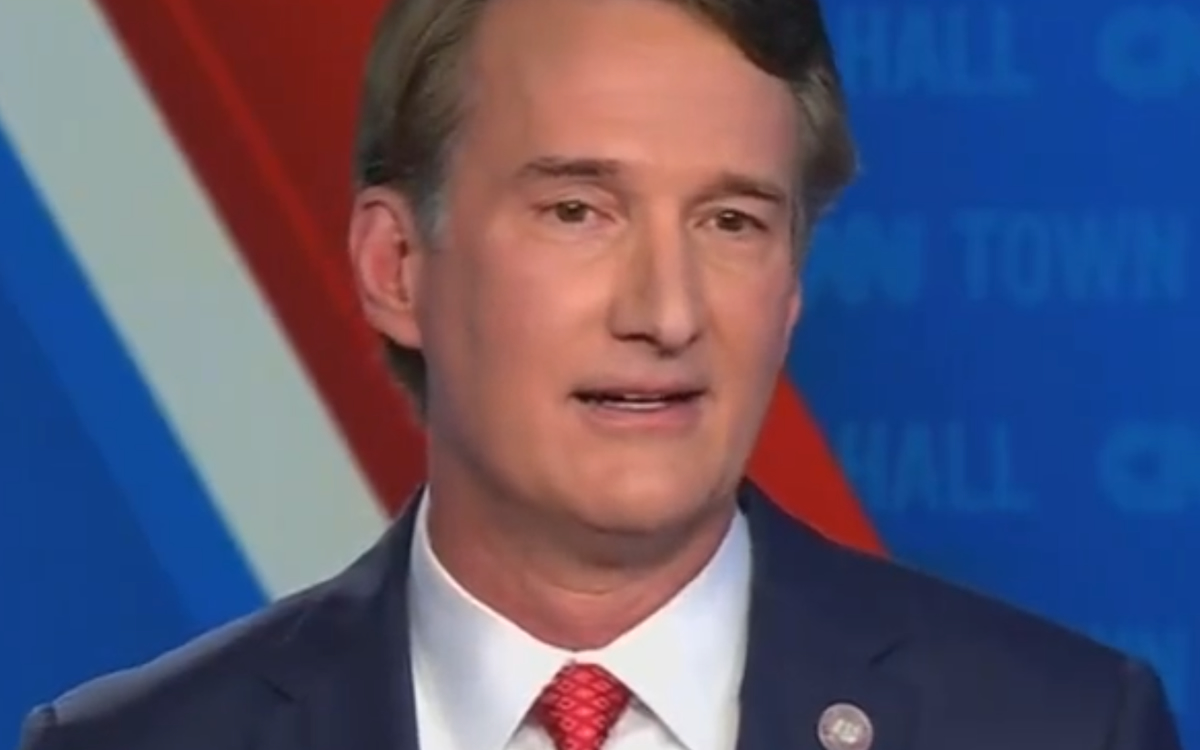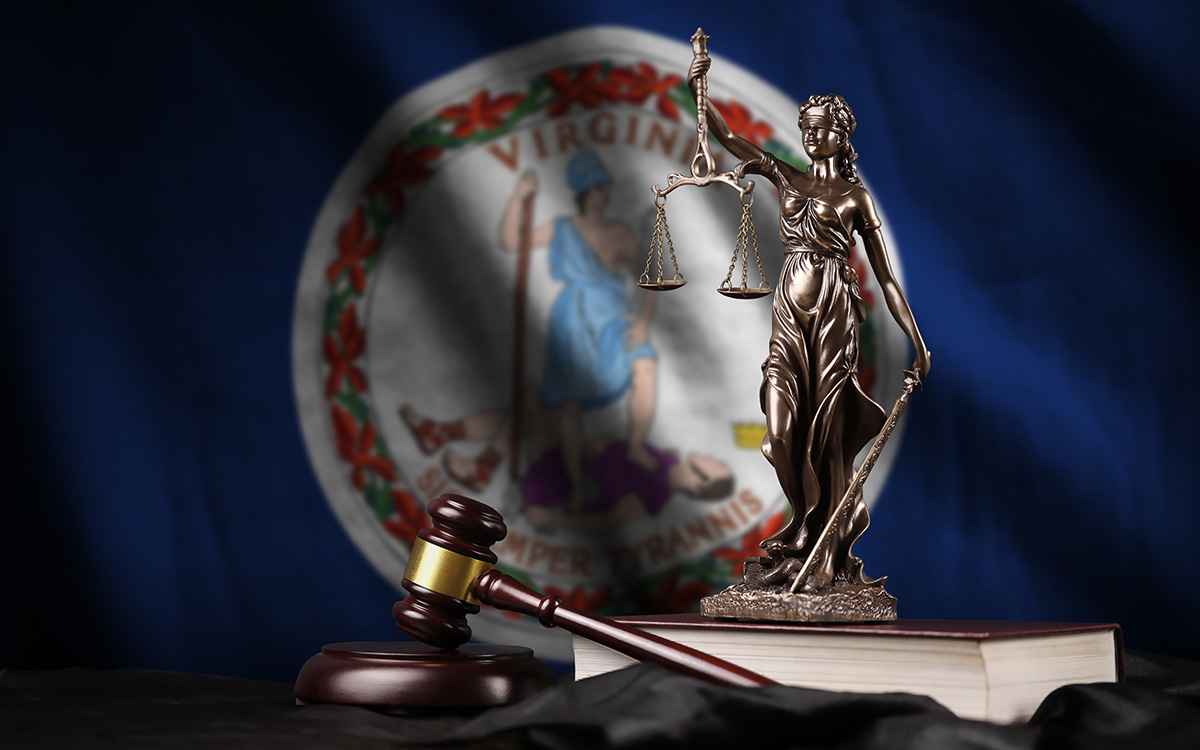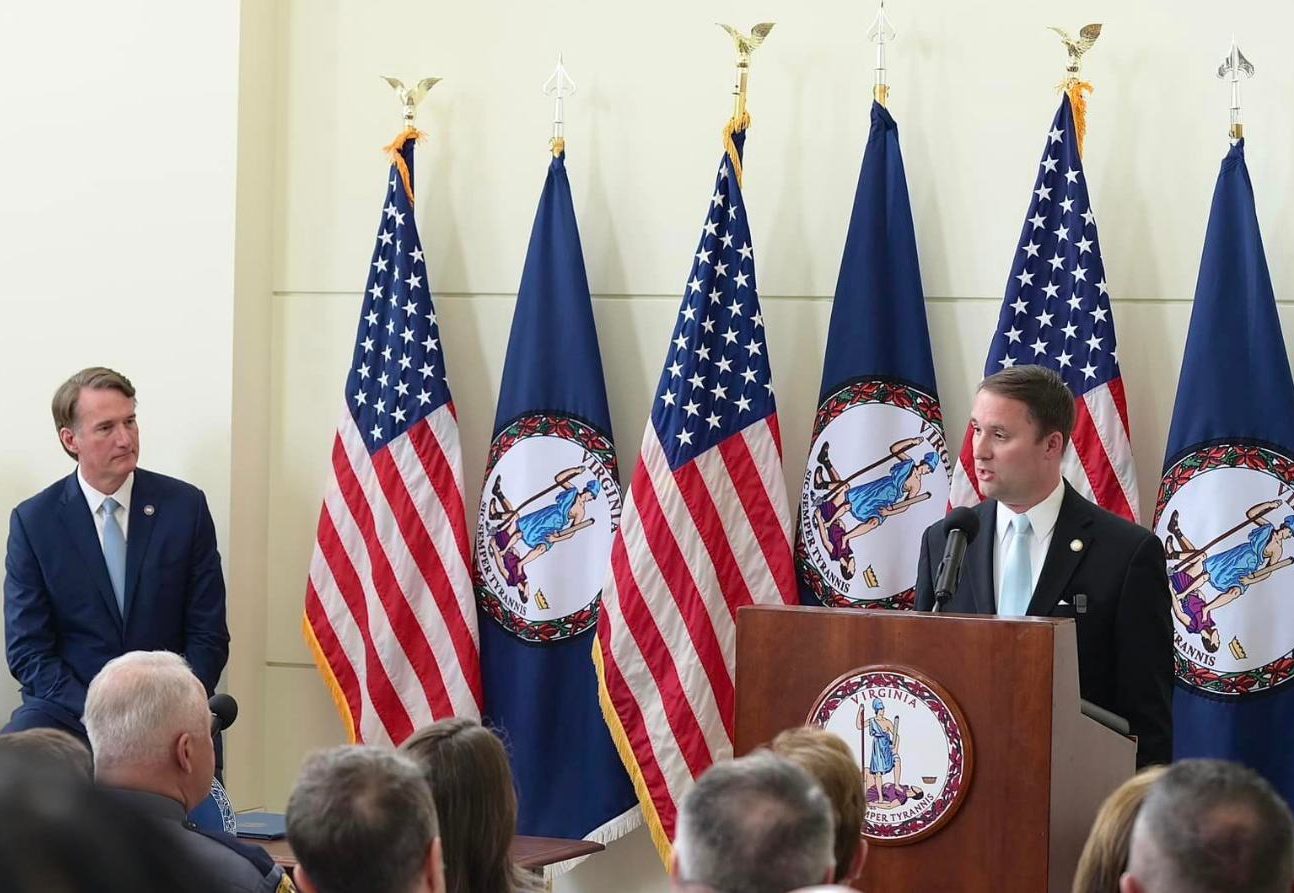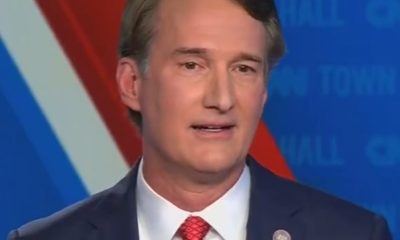Virginia
Glenn Youngkin signs bill that codifies marriage equality in Va. law
Same-sex couples have been able to marry in state since 2014

Republican Virginia Gov. Glenn Youngkin on Friday signed a bill that codifies marriage rights for same-sex couples in state law.
House Bill 174, which state Del. Rozia Henson (D-Prince William County) introduced, is among the dozens of measures that Youngkin signed.
“Two years into his term, Gov. Youngkin has shown leadership and inclusivity, and has finally listened to his constituents with his signing of HB 174,” said Equality Virginia Executive Director Narissa Rahaman in a statement. “The bill passed through the General Assembly with support from both parties, at a time when more than 70 percent of Virginians support marriage equality.”
Voters in 2006 approved an amendment to Virginia’s constitution that defines marriage as between a man and a woman.
Same-sex couples have been able to legally marry in the state since 2014.
The General Assembly in 2021 approved a resolution that seeks to repeal the marriage amendment. It must pass in two successive legislatures before it can go to the ballot.
Democrats control both houses of the General Assembly.
A Virginia Senate committee in January delayed consideration of state Sen. Adam Ebbin (D-Alexandria)’s resolution that would repeal the marriage amendment.
Virginia
Youngkin vetoes bill that would have expanded Va. bullying definition
Bisexual state Del. Joshua Cole introduced House Bill 536

Virginia Gov. Glenn Youngkin on Friday vetoed a bill that would have added sexual orientation, gender identity and expression to the state’s definition of bullying.
Lawmakers earlier this year approved House Bill 536, which bisexual state Del. Joshua Cole (D-Fredericksburg) introduced.
“While I agree with the general purpose of the legislation, regrettably, the General Assembly did not approve my amendments,” said Youngkin in a statement. “Those recommendations would have expanded the definition of bullying to encompass all possible motives.”
“School administrators must work to prevent bullying and support our students’ mental health through a healthy learning environment, but the narrow definition provided in the legislation could be interpreted to exclude groups not included in the Virginia Human Rights Act, such as bullying victims raised with traditional values or those who are in foster care,” added the Republican.
Virginia
Man convicted of murder in Fairfax was propositioned by male victim
Defendant faces possible 40-year prison term

A Fairfax County Circuit Court jury on May 9 found a 31-year-old man guilty of second-degree murder for the June 10, 2023, stabbing death of a Fairfax City, Va., man after the man propositioned him for sex, according to a statement released by the Office of the Fairfax County Commonwealth’s Attorney.
The statement says Aaron Robertson had been charged with killing Luis Barahona Reyes, 50, in an apparent act of revenge after the two men got off a bus in Fairfax City and Barahona Reyes asked Robertson if he would like to engage in sex.
“Robertson and Mr. Barahona Reyes were unknown to each other when they got off the same bus on Draper Street in Fairfax City around 11 p.m. on the night of June 9, 2023,” the statement says. “After a brief conversation, Robertson lured Mr. Barahona Reyes to a parking lot behind 9715 Fairfax Blvd, where Robertson knocked the victim unconscious,” the statement continues.
“Robertson later returned to the scene in the early morning hours of June 10, where he proceeded to beat, stab, and eventually kill Mr. Barahona Reyes,” it says. “Robertson then left and returned a third time to clean up the scene and try to dispose of the victim’s body.”
The statement adds, “Substantial forensic evidence introduced at trial connected Robertson to the murder, including the victim’s blood on his shoes and Robertson’s own DNA under the victim’s fingernails.”
It notes that additional evidence linking Robertson to the murder was obtained from surveillance camera footage and witness accounts from nearby Wawa and 7-Eleven stores showing him entering and leaving the stores multiple times to wash his hands.
“Prosecutors argued that Robertson attacked and killed the victim because Mr. Barahona Reyes propositioned Robertson for sex in their first encounter after getting off the bus,” the statement says.
“I’m personally dismayed this type of crime could happen in this day and age, especially in a community like Fairfax County that prides itself on being welcoming,” said Fairfax County Commonwealth’s Attorney Steve Descano in the statement. “Mr. Barahona Reyes’ death is tragic, and the fact that he may have been killed for his sexuality only further adds to the injustice,” he said.
Robertson is scheduled to be sentenced on July 26 and faces up to 40 years in prison for the second-degree murder conviction.
The Washington Post reports that during Robertson’s trial, a portion of a recording of a confession that Robertson gave to Fairfax City police was played in court. The Post reports that Robertson stated in his confession that after he returned to the scene where he had knocked Barahona Reyes unconscious, Barahona Reyes “slowly got up,” pulled out a knife and lunged at Robertson.
It was at that time, Robertson said in his confession, he became fearful of his life and was able to grab the knife away from Barahona Reyes and stabbed him multiple times, slammed his head on the ground, and strangled him, according to the Post’s story on the trial and conviction.
The Post story adds that Robertson’s attorney urged the jury, based on what he said was Robertson’s fear for his life, to hand down a verdict of manslaughter rather than first-degree murder as requested by prosecutors. As it turned out, the jury handed down a lesser but still serious verdict of second-degree murder.
Virginia
Miyares joins efforts to fight Title IX changes
Republican Va. AG part of multi-state effort

BY NATHANIEL CLINE | Virginia Attorney General Jason Miyares has joined a multi-state effort to stop new Title IX rules from going into effect.
The list of new rules designed to protect victims of campus sexual assaults and the rights of LGBTQ students has come under attack by Republican attorneys general in several states.
Miyares called the changes a “dangerous overhaul” of Title IX, and said the new rules would negatively impact students, families and schools in the commonwealth. The ruling also comes after Gov. Glenn Youngkin’s administration overhauled the commonwealth’s transgender student policies.
“The Biden administration’s unlawful rule would jeopardize half a century of landmark protections for women, forcing the administration’s social agenda onto the states by holding federal funding hostage,” Miyares said in a statement. “They are avoiding Congress and the constitutional process because they know it will not pass. We cannot roll back Title IX in the name of false equity.”

Attorney generals from Tennessee, Indiana, Kentucky, Ohio, and West Virginia have also signed onto the suit, which was filed in Tennessee. Separate lawsuits have been filed in other states, including Louisiana and Texas.
Title IX, which has undergone several transformations based on the political party in office, was created to address women’s rights and prohibits any federally funded school or education program from discriminating against any student based on sex since it was established in 1972.
The Department of Education said some differences compared to the previous version developed under the Trump administration, include protections against all sex-based harassment and discrimination, prohibits schools from sharing personal information, and supports students and families.
Narissa Rahaman, executive director for Equality Virginia, said in a statement that the rule prevents opponents from weakening “crucial” civil rights protections including for LGBTQ students by ensuring that pregnant and parenting students have a right to equal education opportunities, protecting student survivors and guaranteeing the rights of LGBTQ students to come to school as themselves without fear of harassment or discrimination.
“Students across races, places, and genders prove every day that they can do great things, especially when there are strong Title IX protections in place, which is why the Biden administration’s updates to the Title IX rules are essential to ensure every student can thrive at school,” said Rahaman.
The new rule is slated to take effect on Aug. 1 and will apply to complaints of alleged conduct that occurs on or after that date, according to the Department of Education.
Protections
While the ruling protects students and employees from all sex-based harassment and discrimination, it will also impact LGBTQ students and employees, including providing complete protection from sex-based harassment, and prohibiting schools from sharing personal information.
Schools must act “promptly and effectively” to protect and treat all students and staff who make complaints “equitably.” Schools must also provide support measures to complainants and respondents, and act to end any sex discrimination in their programs and prevent any recurrence.
The rule further clarifies the definition of “sex-based harassment,” which means to treat someone unfairly because of their gender; and the scope of sex discrimination, including schools’ obligations not to discriminate based on sex stereotypes, sex characteristics, pregnancy or related conditions, sexual orientation, and gender identity.
The federal agency said the changes will empower and support students and families by requiring schools to disclose their nondiscrimination policies and procedures to all students, employees, and other participants in their education programs so that students and families understand their rights.
The final rule also protects against retaliation for students, employees, and others who exercise their Title IX rights, and supports the rights of parents and guardians to act on behalf of their elementary school and secondary school children.
The rule also protects student privacy by prohibiting schools from disclosing personally identifiable information with limited exceptions, which is something the Youngkin administration has opposed.
Advocates say one of the rights students should have is the power to decide who finds out about their transgender status, to protect them from being bullied or harassed.
Virginia policies
In 2021, the first model policies for trans students were designed under former Gov. Ralph Northam to provide school officials guidance on the treatment of trans and nonbinary students and to protect the privacy and rights of these students.
However, some schools declined to adopt the model policies, and the state law that led to them lacked enforcement incentives or penalties.
The current policies adopted by the Youngkin administration were revised to require parental approval for any changes to students’ “names, nicknames, and/or pronouns,” direct schools to keep parents “informed about their children’s well-being” and require that student participation in activities and athletics and use of bathrooms be based on sex, “except to the extent that federal law otherwise requires.”
Virginia schools have also not fully adopted the newly revised policies, and state law has not changed since the policies were overhauled in 2023.
The Virginia Department of Education faces two lawsuits over the policies adopted by the Youngkin administration.
“All Virginia students, including our transgender and nonbinary students deserve to feel safe and welcomed at schools,” said Wyatt Rolla, a senior trans rights attorney with the ACLU of Virginia. “Accessing restrooms, locker rooms and other facilities that are necessary when you are at school learning is a key part of our schools being inclusive of those transgender [and] non binary students that are part of our community.”
Athletics not included
The provisions under the new Title IX rule did not mention anything about requiring schools to allow trans students to play on teams that align with their gender identity. Virginia has taken its own shot at banning trans athletes from competing in sports through legislation.
In February, the Youngkin administration attempted to challenge the Virginia High School League’s policy on transgender athletes, the Daily Progress reported.
The proposed policy would have matched with the administration’s current policies that students should be placed on teams based on their biological sex rather than their gender identity.
The Virginia High School League, which oversees interscholastic athletic competition for Virginia’s public high schools, allows for trans athletes to participate on teams that match their gender identity, but under certain conditions.
Simultaneously, lawmakers in the Virginia General Assembly controlled by Democrats killed bills, including Senate Bill 68, during the previous session that would have essentially banned transgender students from competing in sports.
State Sen. Tammy Brankley Mulchi (R-Mecklenburg), who carried Senate Bill 723, said students like her 6-year-old granddaughter should have a choice to play with their own gender during a Feb. 1 Senate Education subcommittee hearing.
Mulchi’s bill would have required schools and colleges to have separate sports for boys and girls based on their biological sex. Any dispute would require a note from a doctor.
“If she [my granddaughter] wants to play an all-girl sport, I want her to play against girls that were born girls and not play against someone that is much stronger than her or can hurt her and take away her chances of a scholarship,” Mulchi said.
However, state Sen. Stella Pekarsky (D-Fairfax) argued during the February hearing that whether students are competing with their respective biological sex or not “children of all ages, sexes have different builds and strengths and no children are alike on the same team.”
******************************************************************************************

Nathaniel is an award-winning journalist who’s been covering news across the country since 2007, including politics at the Loudoun Times-Mirror and the Northern Neck News in Virginia as well as sports for the Plain Dealer in Cleveland, Ohio. He has also hosted podcasts, worked as a television analyst for Spectrum Sports, and appeared as a panelist for conferences and educational programs. A graduate of Bowie State University, Nathaniel grew up in Hawaii and the United Kingdom as a military brat.
******************************************************************************************
The preceding article was previously published by the Virginia Mercury and is republished with permission.
Nonprofit. Nonpartisan. No paywalls. Fair and tough reporting on the policy and politics that affect all of us is more important than ever. The Mercury brings you coverage of the commonwealth’s biggest issues from a team of veteran Virginia journalists.
We’re part of States Newsroom, the nation’s largest state-focused nonprofit news organization.
-

 South America2 days ago
South America2 days agoPeruvian government classifies transgender people as mentally ill
-

 District of Columbia3 days ago
District of Columbia3 days agoMeet Jay Jones: Howard’s first trans student body president
-

 Africa4 days ago
Africa4 days agoUgandan president meets with US ambassador
-

 a&e features3 days ago
a&e features3 days agoWhat’s new at Rehoboth Beach for summer 2024










